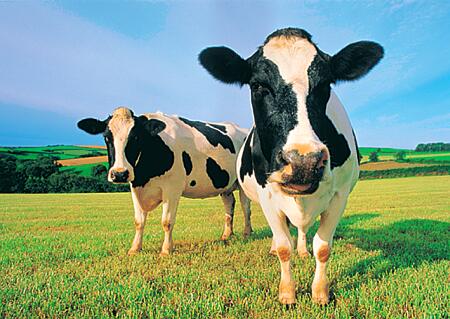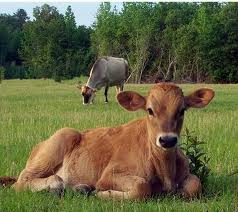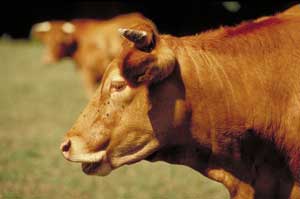

The Clog:
"FATHER," said Freddy running into the
house quite out of breath, "that old cow
has broken into the corn lot again. All the
others quickly followed her. We were
making an oar to our boat, to put in the
place of the one that was broken, and so
we saw the ugly cow push down the fence
with her horns and jump over. Josiah and I
have had a hard time to get them out."
"Poor old Spot, she doesn't know when
she is well off. I shall have at last to put a
clog on her foot, that will stop her
mischief."
So the unruly cow, who would not be
content in her nice clover field, where was
plenty of food, and a nice running stream to
drink from, had a heavy block chained to
her which she could -draw about, but not
jump with.
It was very unpleasant, and she tried her
best to shake herself loose from it, but all
to no purpose. At last she gave it up and
settled down as quietly as the rest of the
herd grazing in the same pasture.
"That cow makes me think of the way
God deals with his children sometimes,"
said grandpa, as he sat with little May on
his knee by the sunset window, looking out
on the field where the cattle were.
"Why does it grandpa?" asked Freddy.
"When their feet get to straying, he often
sends some trouble to act like a clog upon
them. One of his dear children was growing
ing too fond of gay company. She often
looked at her face in the glass, and
thought, with pride, how beautiful it was.
To save her poor soul, God sent a mist of
darkness over her eyes, and she grew
blind. Then she must leave the company
that was such a snare to her, and she could
not see the face she was in danger of
worshiping rather than her God. Many times
afterward did she thank him for sending
her this trouble which led her to rest
wholly upon Jesus. She knew that the
blindness was only for a little while here,
that she was soon going to a land
where all eyes shall be opened. Grandpa
has had many a clog in his day, which he
thought very hard at the time, but he saw
the use of it afterward.
"Don't fret at crosses, dear children, for
they are all meant to teach us some lesson
of good, to keep us back from some evil
way that would bring us into far greater
trouble and danger."
Child's World.
THE gates of Heaven are low-arched; we
must enter upon our knees.

Cows
Then the LORD said unto Moses, Go in unto Pharaoh, and tell him, Thus saith the LORD God of the Hebrews, Let my people go, that they may serve me.
For if thou refuse to let them go, and wilt hold them still,
Behold, the hand of the LORD is upon thy cattle which is in the field, upon the horses, upon the asses, upon the camels, upon the oxen, and upon the sheep: there shall be a very grievous murrain.
And the LORD shall sever between the cattle of Israel and the cattle of Egypt: and there shall nothing die of all that is the children's of Israel.
And the LORD appointed a set time, saying, To morrow the LORD shall do this thing in the land.
And the LORD did that thing on the morrow, and all the cattle of Egypt died: but of the cattle of the children of Israel died not one.
And Pharaoh sent, and, behold, there was not one of the cattle of the Israelites dead. And the heart of Pharaoh was hardened, and he did not let the people go.
And the LORD said unto Moses and unto Aaron, Take to you handfuls of ashes of the furnace, and let Moses sprinkle it toward the heaven in the sight of Pharaoh.
And it shall become small dust in all the land of Egypt, and shall be a boil breaking forth with blains upon man, and upon beast, throughout all the land of Egypt.
And they took ashes of the furnace, and stood before Pharaoh; and Moses sprinkled it up toward heaven; and it became a boil breaking forth with blains upon man, and upon beast.
And the magicians could not stand before Moses because of the boils; for the boil was upon the magicians, and upon all the Egyptians.
And the LORD hardened the heart of Pharaoh, and he hearkened not unto them; as the LORD had spoken unto Moses.
And the LORD said unto Moses, Rise up early in the morning, and stand before Pharaoh, and say unto him, Thus saith the LORD God of the Hebrews, Let my people go, that they may serve me.
For I will at this time send all my plagues upon thine heart, and upon thy servants, and upon thy people; that thou mayest know that there is none like me in all the earth.
For now I will stretch out my hand, that I may smite thee and thy people with pestilence; and thou shalt be cut off from the earth.
And in very deed for this cause have I raised thee up, for to show in thee my power; and that my name may be declared throughout all the earth.
As yet exaltest thou thyself against my people, that thou wilt not let them go?
Behold, to morrow about this time I will cause it to rain a very grievous hail, such as hath not been in Egypt since the foundation thereof even until now.
Send therefore now, and gather thy cattle, and all that thou hast in the field; for upon every man and beast which shall be found in the field, and shall not be brought home, the hail shall come down upon them, and they shall die.
He that feared the word of the LORD among the servants of Pharaoh made his servants and his cattle flee into the houses:
And he that regarded not the word of the LORD left his servants and his cattle in the field.
And the LORD said unto Moses, Stretch forth thine hand toward heaven, that there may be hail in all the land of Egypt, upon man, and upon beast, and upon every herb of the field, throughout the land of Egypt.
And Moses stretched forth his rod toward heaven: and the LORD sent thunder and hail, and the fire ran along upon the ground; and the LORD rained hail upon the land of Egypt.
So there was hail, and fire mingled with the hail, very grievous, such as there was none like it in all the land of Egypt since it became a nation.
And the hail smote throughout all the land of Egypt all that was in the field, both man and beast; and the hail smote every herb of the field, and brake every tree of the field.
Only in the land of Goshen, where the children of Israel were, was there no hail.
And Pharaoh sent, and called for Moses and Aaron, and said unto them, I have sinned this time: the LORD is righteous, and I and my people are wicked.
Entreat the LORD (for it is enough) that there be no more mighty thunderings and hail; and I will let you go, and ye shall stay no longer.
And Moses said unto him, As soon as I am gone out of the city, I will spread abroad my hands unto the LORD; and the thunder shall cease, neither shall there be any more hail; that thou mayest know how that the earth is the LORD's.
But as for thee and thy servants, I know that ye will not yet fear the LORD God.
And the flax and the barley was smitten: for the barley was in the ear, and the flax was bolled.
But the wheat and the rie were not smitten: for they were not grown up.
And Moses went out of the city from Pharaoh, and spread abroad his hands unto the LORD: and the thunders and hail ceased, and the rain was not poured upon the earth.
And when Pharaoh saw that the rain and the hail and the thunders were ceased, he sinned yet more, and hardened his heart, he and his servants.
And the heart of Pharaoh was hardened, neither would he let the children of Israel go; as the LORD had spoken by Moses.
Exodus 9:1-35
WORSE THAN VICIOUS CATTLE.
IN some portions of California there are extensive plains, which are watered only by irrigation. For eight months there is no rain, and very little during the winter, or remaining part of the year. In the spring, when the snow melts upon the mountains, the water runs down upon the plains and fills the rivulets and ditches, and thus a supply is secured for a time. It is conveyed in ditches, which run for miles around and through tracts of land owned by different individuals. Those wishing to water their land make openings into these ditches, through which the water flows out upon the land.
Large herds of cattle and sheep are kept upon these plains. Frequently from ten to fifteen hundred sheep can be seen in one drove. Sometimes they wander many miles from water, and have to be driven long distances to find it, at the foot of the mountains or in some river.
At one time the banks of one of these large ditches gave way and the water flowed over many acres, so that for miles nothing could be seen but one sheet of water. The ground became so soft that cattle could not walk upon it without miring. A drove of not less than fifteen hundred cattle, frantic with thirst, came from a long distance, and finding plenty of water rushed in, and were soon unable to extricate themselves from the mud.
Had these cattle been less vicious, some of them might have been saved. Those who had the care of them, being mounted upon horses, went into the water and helped out many; but as soon as they were free from the mud, they turned upon their benefactors, obliging them to flee into the water for safety. Here the enraged animals followed them, and again became fast in the mud; thus this large number of cattle starved to death in the water.
When this was related to me by an eyewitness, I thought of how Jesus came to this world to save mankind; how he died to purchase a free pardon for our sins, and is continually delivering us from trouble and bestowing upon us great blessings.
But instead of giving him love and gratitude in return, how often we manifest ingratitude and disobedience. Children often forget that kind parents, Christian instructors, and the privileges of the Sabbath-school, are God's agents to help us out of the "horrible pit and miry clay" of sin, and safely place our feet upon the rock Christ Jesus.
We should be the most grateful people in the world for the privileges, which we enjoy. If we do not appreciate all these blessings we are far worse than those vicious cattle; for we possess moral powers, and can understand who our benefactors are. I trust that none of the readers will be guilty of such ingratitude.
S. N. HASKELL.
I drive my own two-horse team, visit the lumber mills and order lumber the workmen require, and go out in search of cows. I have purchased two good cows. . . . Almost everywhere in the colonies they have a strange custom of confining the cows at milking time.
They put her head in a fixture called a bail, then tie up one of her legs to a stake. It is a barbarous practice. I told those of whom I bought my cows that I should do no such thing, but leave the creature free and teach them to stand still. The owner looked at me in astonishment. "You cannot do this, Mrs. White," he said, "They will not stand. No one thinks of doing any other way." "Well," I answered, "I shall give you an example of what can be done." I have not had a rope on a cow's leg, or her head in a bail. . . . We have treated our cows gently and they are perfectly docile.
I do not propose to tell all the annoyances and perplexities that are constantly coming in. . . . 3MR 406-407